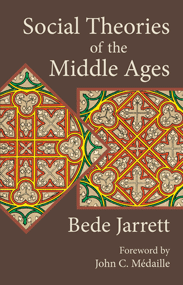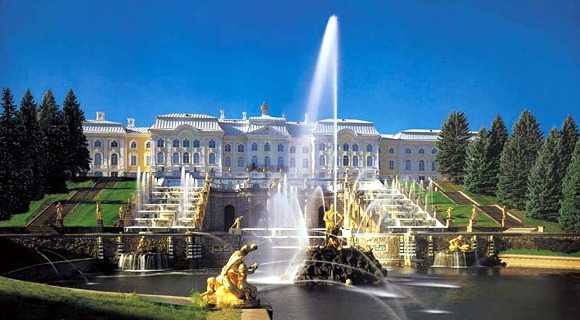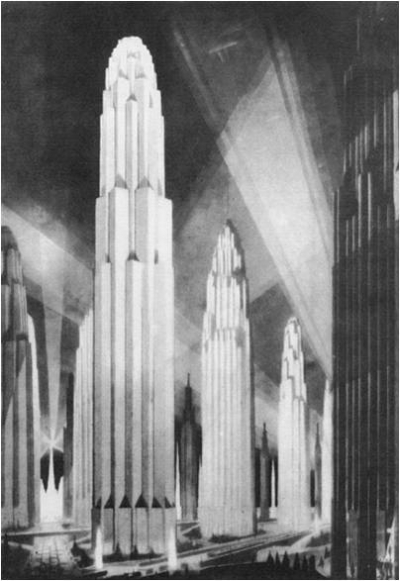There is the idea touted by some that “a thing can be known only by its opposite.” Perhaps this idea has more cache in today’s parlance due to the rise of eastern philosophies in the west. However attractive the idea sounds on the most important questions it doesn’t hold up. The Devil does indeed need God, but God has no need of the Devil. Adam and Eve had every chance of knowing God perfectly before the presence of sin — of course sin prevents us from knowing God as we ought.
Still, on lesser questions the aphorism has its usefulness, including in History. We rarely can see  the nose on our face, and so it’s hard to understand one’s own society just by looking at one’s own society. Instead we need perspective, and history can provide this. Of course we should not look at history merely as a vehicle for understanding our own time. Rather we can say that good history both opens up new worlds to us and sheds light on our own. Such is the accomplishment of Bede Jarrett’s Social Theories of the Middle Ages. His chosen title fails to inspire, and at times his writing follows his title and gets bogged down and technical. But all in all Jarrett succeeds in his stated aim of fairly portraying a world strangely familiar to us and yet not so familiar.
the nose on our face, and so it’s hard to understand one’s own society just by looking at one’s own society. Instead we need perspective, and history can provide this. Of course we should not look at history merely as a vehicle for understanding our own time. Rather we can say that good history both opens up new worlds to us and sheds light on our own. Such is the accomplishment of Bede Jarrett’s Social Theories of the Middle Ages. His chosen title fails to inspire, and at times his writing follows his title and gets bogged down and technical. But all in all Jarrett succeeds in his stated aim of fairly portraying a world strangely familiar to us and yet not so familiar.
Jarrett divides his examination by category, and so we have chapters on Law, Education, Women, and son on. Right away in his first chapter on “Law” we see differences between us and them. Before thinking about particular laws the medievals thought in terms of their proper “ends” or to use the Greek term, the “telos” of a particular law. No law made sense unless put in a larger theological context. In order to know this context we need to know not just our ends as human beings in general, but also our origins. So any medieval theory of law must first start by talking about creation, natural law, sin, and so on. Then they move on to questions about salvation, and the role of law as an aid to that process. Having done this, now we can move on to actual laws. So while the medievals often focused on the big picture, they had a rigid categorical exactness about their thinking.
This had two seemingly different kinds of consequences. One is that specific laws might matter much less than the theory behind the laws, and so law itself disappears in the shuffle. We see this in one medieval Welsh code of “law” where a woman could be remitted for a particular offense if she paid a fine of “a penny as wide as her behind.” In other words, we need not worry about law at all. On the other hand, medieval thinkers consistently mentioned that law “must adhere to the bones of the people” — it had to fit a time and context (again we see the medieval exactitude at work) to have real validity.
I said these attitudes presented only a seeming difference. What held them together, I think, is that for them laws had validity only because of our temporal earthly existence. When “History” serves its purpose we shall have no need of law at all. To understand the place of law one must first understand the temporary nature of the state itself. One then, can play with law, either to fit a particular occasion, or in the case of the Welsh, for our particular amusement. It is this sense of distance from law the medievals had that differentiates our society and theirs. Anyone who has been ticketed in a “Mandatory Headlight Use Area” though the sun shines brightly, or been caught in a speed trap on a road with a speed limit well below the road’s design, has felt the absolute nature of law in the modern west. We treat the law thusly because we do not do as the medievals did — we have no “higher end ” in view, only the power of the consent of governed at our disposal.
But I should not give the impression that Jarrett romanticizes the Middle Ages, though I think he certainly is fond of them. He wades into the controversy surrounding how to translate the Latin word “servus,” and has no qualms about rendering it as a “slave.” He denies that slavery disappeared during the middle ages (though it did decrease significantly from Roman times) because a certain class of people had no legal freedoms. In this he departs from the fiery Regine Pernoud, who called it the height of ignominious irresponsibility to render “servus,” as “slave.”* The strict categorical methodology they used spilled over into their society at large at times to an unhealthy degree.
The modern perspective on such a social arrangement might incline towards tolerance — some might excuse it as a necessary stage to better things down the road (much as some might excuse the condition of the urban lower-class at the beginning of the industrial era). They might be less willing to excuse the medieval view of women, at least at first glance. Here Jarrett urges caution, for most often those that wrote were monks, because they had the best educations. And monastic writing about women would have its own particular concerns apart from the larger community. One gets a more robust picture of medieval women in the Canterbury Tales, for example. Jarrett points out that,
- Women who entered convents could receive a very similar kind of education as men. That the education of men and women would be equal in any sense might have been a historical first.
- “Their intelligence is more keen and more quick than that of a man.” So said Franco Sanchetti, with general agreement from others.
- Women had some opportunity to make a vital contribution to Christian culture at large, witness Christiana de Pisan.
- Women had an honored place as nuturers and civilizers of men.
- No era that gave such veneration to the Blessed Virgin Mary could be said to truly denigrate women.
But Jarrett also points out that women often got blamed for the Fall of mankind in general. And many saw women as quicker to do evil than men — Sanchetti, quoted above, admired feminine intelligence but thought they used this intelligence to work more evil than men.
As Jarrett often does, he turns to Aquinas to help provide balance between these two seeming poles. “The image of God in man in its principal signification — namely, the intellectual nature — is found both in man and in woman . . . . But in a secondary sense the image of God is found in man and not in woman: for man is the beginning and end of woman, as God is the beginning and end of all things. So when the Apostle had said that man is the image and glory of God but woman is the glory of man (I Cor. 11:7), he adds this reason, ‘for man is not of woman, but woman of man; and man was not created for women, but women for men.'” Again in Aquinas, as we see so often, the “telos” of things guided their thinking.
We moderns cringe at this, but the best medievals would not have seen secondary status (if we wish to call it that) as denigrating. We tend to measure worth in accomplishments or opportunities to live as we wish. The medievals found glory in living out one’s assigned role in the grand cosmic dance that led to salvation. So St. Francis (a man who understood chivalry perfectly) in his glorious “Canticle of the Sun” (see below) exults in the feminine aspects of creation because the feminine exults in meekness, which leads to humility. And without humility no one can receive salvation. From the medieval perspective (here I speculate) Jesus does not say, “The poor will always be with you,” because of the inevitability of sin, or the intractable problems of just political and economic systems. Rather, some must play the role of “poverty” so that others will have the chance of exercising charity, and thereby become more like God.
This leads to what might most interest our economically minded/obsessed age, the medieval attitude towards money and property (there is an extended chapter on the medieval attitude towards war as well, but that gets covered in large measure here for any who have interest). We experience confusion in the modern world about such things because we have no proper sense of the “telos” of money. Jesus gives us many warnings about money’s destructive power, and yet we need money to live. Money therefore has a proper place in the scheme of things, but money must be subordinated to its proper “end.” So we should have enough to provide for our family. We should seek also to have enough to practice charity. Such is the proper, though temporary “end” of money. Some would probably argue that a few might have a lot more money than this, but why? To better reflect the image of God to creation, in this case, that of munificence or “kingly joy.” By custom, though not law, the wealthy were expected to royally “fete” the poor under their charge on the most prominent of feast days (indeed, the mingling of rich and poor would have been much more common then than now).^
Property ownership as well came with this same tension. Since God truly owned all things, in what sense could we own anything? Medieval concepts of ownership absented themselves from our modern absolute legal concepts. Rather, medievals “had use” of certain things, and then only on a contingent basis. So the king had power provided he upheld his oath. Nobles could receive grants of land from the king provided they served him faithfully. None owned anything absolutely. The right to use something depended on whether or not you used it faithfully, according to the telos of the thing used. Jarrett points out that absolute concepts of ownership came to the modern west with a revival of classical ideas in the Renaissance. For the Romans, Rome was the telos of all things, so Roman ownership of property or people could be absolute. They had nothing beyond themselves from which they could take their pulse. Aesthetically too, the contingent complexities of the medievals created stained glass. The clear simplicities of the Renaissance smashed many of these windows and replaced them with clear panes just as the clear, classical concepts of Roman law began to replace the complex labyrinth that was the medieval synthesis.
In the early 20th century a group of thinkers led by men like G.K. Chesterton and Hillaire Belloc attempted to revive medieval economic concepts for the modern world. They failed to make much headway, and most of their admirers attribute this failure to a lack of a defined system or program adapted for the modern world. I have a different idea as to their lack of success.
Many might admire medieval views on property and wealth, but they arose within a defined context. Specifically, the medieval focus on contextualizing everything in light of its place in the scheme of salvation gave them a framework in which to place wealth and property. We have rejected the context of medieval views on things, and without that context, we have no agreed upon telos for money and property as the medievals had. Our society values maximizing freedom and opportunity for the individual, and so the more wealth, the more opportunities to extend the self into places yet unknown. Again, the medievals valued stability much more than change, innovation, and the need for “forward momentum.” Without the medieval theological and psychological context, medieval ideas about economics would be dead on arrival. We often wish to have our cake and eat it as well, but societies can not be put together in such a hodge-podge fashion. We must choose the telos we pursue.
Dave
*Solving this riddle depends largely on how one defines “slave.” Medieval peasants at the very bottom of the social ladder were slaves in the sense that they had very very few freedoms they could exercise on their own. Unlike the slaves of most other cultures, however, even those at the very bottom had certain engrained legal protections in law and from the Church. Also medieval “slaves” were almost entirely bound to the soil, which meant certain periods of long hours, and certain extended periods of relative inactivity. And they also would have been exempt from work on numerous medieval feast and saint days in the Church calendar.
^In his The Court Society, Norbert Elias mentions a few aristocratic Spanish families who bankrupted themselves by projects, gifts, and feasts for those in their charge, and gained glory thereby. Their family had in a sense, fulfilled its place in society by demonstrating such largesse.
— Regarding the “Canticle of the Sun” . . .
I partially agree with those that regard St. Thomas and St. Francis as the best fulfillment of medieval society. St. Thomas’ massive Summa Theologica stands as perhaps the greatest extended theological treatise in the history of the Church. But St. Francis possibly had a greater degree of sanctity. And in one fell swoop of poetic insight, St. Francis both perfectly expressed the medieval vision and revealed timeless truths.
Most high, all powerful, all good Lord!
All praise is Yours, all glory, all honor, and all blessing.To You, alone, Most High, do they belong.
No mortal lips are worthy to pronounce Your name.Be praised, my Lord, through all Your creatures,
especially through my lord Brother Sun,
who brings the day; and You give light through him.
And he is beautiful and radiant in all his splendor!
Of You, Most High, he bears the likeness.Be praised, my Lord, through Sister Moon and the stars;
in the heavens You have made them bright, precious and beautiful.Be praised, my Lord, through Brothers Wind and Air,
and clouds and storms, and all the weather,
through which You give Your creatures sustenance.Be praised, my Lord, through Sister Water;
she is very useful, and humble, and precious, and pure.Be praised, my Lord, through Brother Fire,
through whom You brighten the night.
He is beautiful and cheerful, and powerful and strong.Be praised, my Lord, through our sister Mother Earth,
who feeds us and rules us,
and produces various fruits with colored flowers and herbs.Be praised, my Lord, through those who forgive for love of You;
through those who endure sickness and trial.Happy those who endure in peace,
for by You, Most High, they will be crowned.Be praised, my Lord, through our sister Bodily Death,
from whose embrace no living person can escape.
Woe to those who die in mortal sin!
Happy those she finds doing Your most holy will.
The second death can do no harm to them.Praise and bless my Lord, and give thanks,
and serve Him with great humility.













